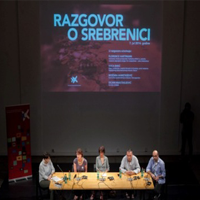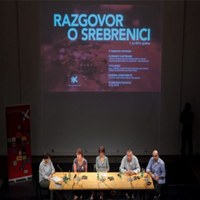Srebrenica: Victims’ 21-years-long search for the truth and its acknowledgement
 On the occasion of marking the 21st anniversary of the Srebrenica genocide, the Humanitarian Law Center (HLC) organized a debate dedicated to the victims of the Srebrenica genocide. The panellists Nidžara Ahmetašević, Ivica Đikić, Florence Hartmann and Dejan Anastasijević discussed before a hall full of people at the Centre for Cultural Decontamination, the responsibility for the killing of several thousands of people in and around Srebrenica during July 1995, and the years’ long struggles of victims of this crime for the truth and its acknowledgement.
On the occasion of marking the 21st anniversary of the Srebrenica genocide, the Humanitarian Law Center (HLC) organized a debate dedicated to the victims of the Srebrenica genocide. The panellists Nidžara Ahmetašević, Ivica Đikić, Florence Hartmann and Dejan Anastasijević discussed before a hall full of people at the Centre for Cultural Decontamination, the responsibility for the killing of several thousands of people in and around Srebrenica during July 1995, and the years’ long struggles of victims of this crime for the truth and its acknowledgement.
When opening the debate, the HLC Executive Director, Sandra Orlović, noted that the public space for the discussion and remembrance of Srebrenica is getting narrower by the day. It has now been reduced to a symbolic few square metres of pavement, where civil society activists and interested citizens organize street actions in order to pay respect to the Srebrenica victims. Ms. Orlović also pointed to the absurdity of public discourse in Serbia, which glorifies the criminals while at the same time offering token gestures of apology for their crimes.
A journalist from Bosnia and Herzegovina, Nidžara Ahmetašević, presented a female perspective on the Srebrenica genocide, presenting the women of Srebrenica as role models of courage whose struggles and fates are not sufficiently talked about. The women of Srebrenica today, after the killing of generations of Srebrenica men, have become the pillars of their families: they work completely independently, and have initiated various different business activities. They are also very often subject to political manipulation in which they are personally not willing to participate, during their quest to find out the truth about the killing of their children. The manipulation of the Srebrenica tragedy for the sake of gaining political points sheds light on the negligence shown by politicians towards the needs of the victims themselves, who, for their part, have only one worry, and that is, how to survive.
Ms. Ahmetašević also reminded the audience of one issue which has been neglected, which is the rape of women in Srebrenica in July 1995. Very often the victims themselves have no desire to speak about this, because they are focused mainly on finding the mortal remains of their family members.
A writer and publicist from Croatia, Ivica Đikić, presented his recently published documentary novel, “Beara“, and his motives for outlining the personality and work of one of the creators of the Srebrenica genocide. It took the author 10 years to do the research and write the book, the idea for which was born after he attended the 10th anniversary of the genocide at the Potočari Memorial Center. His main preoccupation was to find the way in which the Srebrenica genocide was executed. This topic led him to the personality of Ljubiša Beara, the Republic of Srpska Chief of Security in the General Staff, who, according to Mr. Đikić, started thinking about how to kill the 8,000 people on July 11th and 12th, 1995.
The author was particularly intrigued by the question of how it was possible that former Yugoslav People’s Army officers executed this genocide, when only a few years before they had been devoted to the idea of Yugoslavia. He concluded that, in fact, there had been no drastic change, since these were persons of subordinate mentality, who substituted their faith in Yugoslavia with another faith – nationalism and its policies. They were also more prone to committing such serious crimes because, in the newly-established structures, they had to prove themselves, in order to „wash away their Communist past“.
A journalist and former spokesperson for the ICTY Office of the Prosecutor, Florence Hartmann, spoke about her book „The Srebrenica Affair – The Blood of Realpolitik“, which re-examines the responsibility of the international community for the Srebrenica genocide. She emphasized that the findings she came across during her research do not to any extent mitigate the responsibility of the executors of the genocide. However, she believes that the international community did not do enough to prevent the Srebrenica genocide from happening. Ms. Hartman highlighted that there were no obstacles in 1995 to the UN Security Council reacting decisively, and that the international community did not send clear messages to the aggressors in the way in which it has done in some other conflicts. She concluded had become tired in 1995, and that the countries of the Western Europe believed that the establishing of the ICTY was a sufficient reaction to the crimes committed in the wars in the former Yugoslavia. When all of the peace negotiations had crumbled by 1995, the „simplest solutions“ were being sought in the Dayton process, which meant, „the simplification of the map of the territories“. Ms. Hartmann believes that the international community failed to establish moral principles for the peace negotiations and that Srebrenica, in their eyes, represented only a problematic point on the map and not the people detained in what seemed to be an enclave, or their fates.
Ms. Hartmann also criticized the work of the ICTY investigators, because they stopped trying to establish the links between the Yugoslav Army and the Republic of Srpska Army.
A journalist from Serbia, Dejan Anastasijević, emphasized that the Yugoslav Army financed and supplied the Republic of Srpska Army. Then he expressed his opinion about the way in which Srebrenica is perceived by the public in Serbia today. He stated that in the beginning it was believed in Serbia that the Srebrenica genocide had not happened, and that it was only propaganda. Thanks to the video footage aired in 2005 which showed the execution of Bosniak civilians in the village of Trnovo, the Serbian public accepted that a crime had been committed. Then the third phase began. In this phase, the public in Serbia accepted that a crime was committed in Srebrenica, but not that it was genocide. Today, Mr. Anastasijević claims, Serbia represents retrograde theses about the Srebrenica genocide, minimizing it, and sometimes even glorifying it.
Simo Spasić from the Association of the Families of the Kidnapped and Killed of Kosovo and Metohija stated that, in his opinion, the debate should have started with a moment of silence for the Srebrenica victims. He reminded the audience that he was the only representative of the associations of Serbian victims who attended the commemoration in Potočari. As an answer to the question about the similarities between Beara and Eichmann, Ivica Đikić stated that one cannot avoid the comparison with Eichmann, since both of these individuals perceived the killing of thousands of people as their work. However, he also pointed to some important differences, reflected in the fact that Eichmann had a „killing system“ at his disposal in the execution of the „final solution“, whereas Beara did not. He had, rather, to improvise. Mr. Đikić thinks that thanks to the organizational skills of Ljubiša Beara the execution of the genocide or at least its scope was made possible. A journalist from Belgrade, Rade Radovanović, underlined that the Srebrenica genocide was planned in the Yugoslav Army General Staff, and that one man could not have designed such a crime.
Earlier that day, the SENSE Agency and the HLC presented the narrative produced by the SENSE Agency about the Srebrenica genocide, titled „Srebrenica: Genocide in Eight Acts“, at the Belgrade Media Centre. The narrative was presented by its authors, Mirko Klarin and Mina Vidaković from the SENSE Agency. It contains a presentation of material from the permanent exhibition of the SENSE Documentation Centre at the Potočari Memorial Centre. Leading the spectator through an abundance of evidence, and the testimonies of victims, perpetrators and witnesses, the presentation offers a comprehensive overview of the judicial facts about the persecution of citizens from the Srebrenica municipalities. The epilogue of the presentation shows the consequences that the genocide had for the local Bosniak community, and for those individuals whom the ICTY established beyond reasonable doubt that they had participated in or aided and abetted the commission of the genocide.








